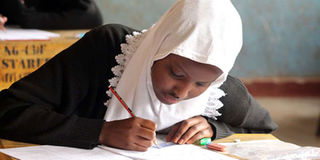The one question on education we need to answer

A Moi Avenue Primary School pupil writes her Kenya Certificate of Primary Education examination on November 1, 2018. Results in this examination determine which secondary schools the children will be admitted to. PHOTO | FILE | NATION MEDIA GROUP
What you need to know:
- In the absence of a coherent education philosophy in this country, we are bound to repeat the same mistakes that were made with 8-4-4.
- We must comprehensively address the core question concerning education before we decide how to structure the education system.
This coming week, our children will sit their primary school exit examinations, the Kenya Certificate of Primary Education (KCPE) examination.
Results in this examination determine which secondary schools the children will be admitted to, with the top scorers having a pick of schools considered to be the best, while those at the bottom of the pyramid are sent to whatever is left afterwards.
Our education system, 8-4-4, has been roundly condemned as being too examination-focused and neglecting important aspects of child development that education is supposed to be responsible for.
The initial conceptualisation, according to public pronouncements over the past 30 years, was to create a system that gave young people the opportunity to learn practical life skills that would be useful to them even if they dropped out of school.
Over time, and due to the huge investments required for this, the practical components were gradually eliminated from the curriculum and what was left was lots of rote learning.
NEW CURRICULUM
As a result of these changes in the system, practical assessments became meaningless and what was left was a series of quantitative assessments that reduced a child’s educational attainment to a score out of 500 marks.
This is the real driver of the examination-as-an-end movement in the education system, the people who drill their pupils with information and test in the hope that by the time they will confront KCPE, they will have memorised enough to score above average.
The purveyors of the anti-8-4-4 arguments are not necessarily newcomers to the scene, and have made similar arguments since the inception of the system.
As a result of their unrelenting criticisms, a decision was made to change the system once again, with the only clear philosophical statement being contained in the moniker for the new system- ‘Competency-based Curriculum (CBC)’.
By the time the CBC was being rolled out, there was no policy framework to support it. This was only belatedly tabled in Parliament recently.
HASTINESS
Indeed, the first Cabinet secretary given the responsibility to implement it declared that the sector was not ready for the new curriculum.
She was quickly shown the door and replaced with someone who was considered to be more prepared to implement it, whether the sector was ready or not.
In the absence of a coherent education philosophy in this country, we are bound to repeat the same mistakes that were made with 8-4-4, including gradual reversion to familiar territory due to under-investment and inadequate competency on the part of the educators.
Currently, many in the education sector are still in the dark concerning the CBC trajectory beyond early primary school.
Despite the government touting Technical and Vocational Training as the magic bullet for addressing unemployment among youth, there is no clear framework for transition from basic education to tertiary institutions of learning.
We must comprehensively address the core question concerning education before we decide how to structure the education system.
Why do we take our children to school? Without a consensual and coherent answer to this question we will continue floundering in the dark, hurtling from one system to another, while destroying the lives of those whose future we are only custodians of.
Professor Atwoli is the Associate Professor of Psychiatry, Moi University School of Medicine [email protected]





